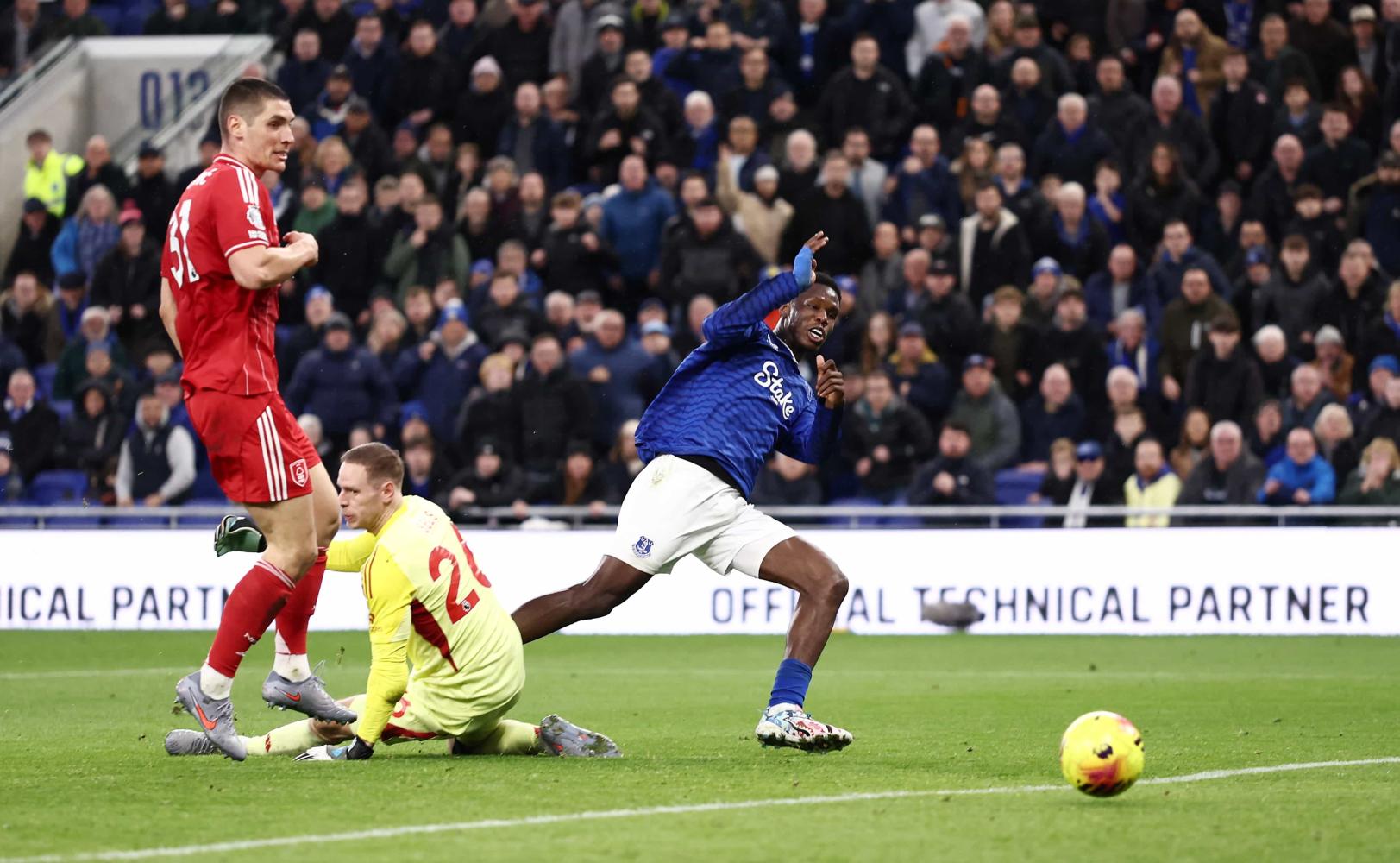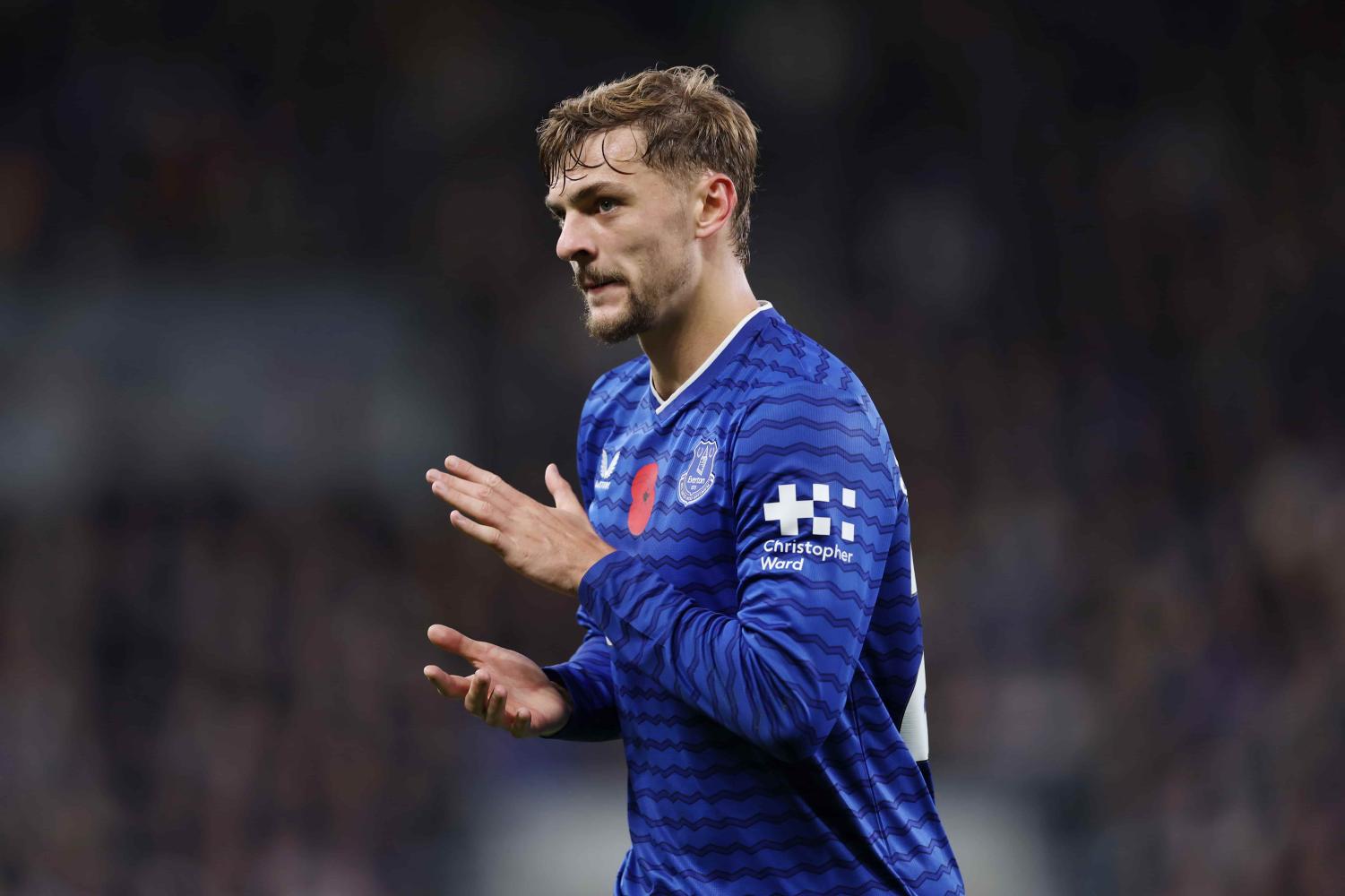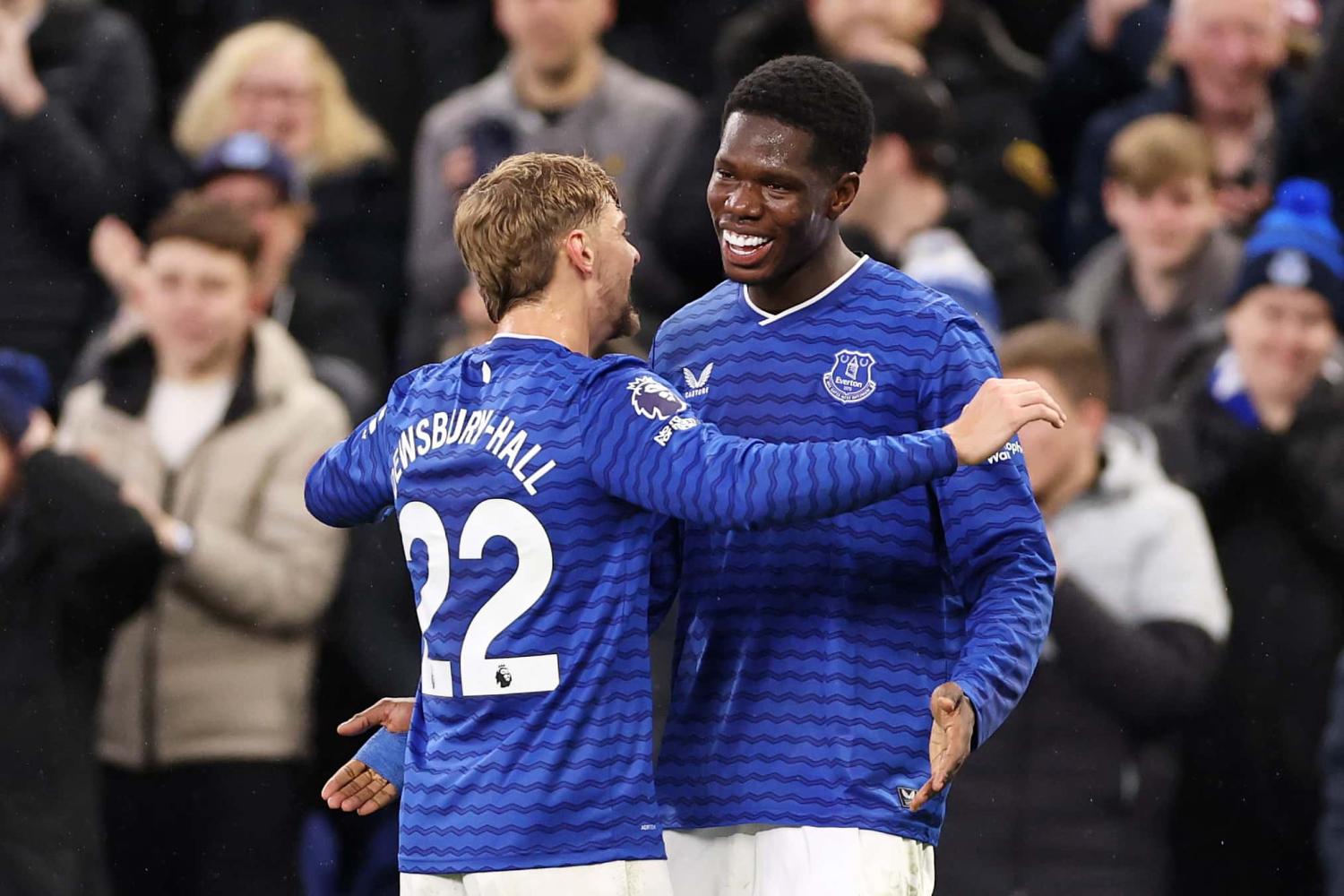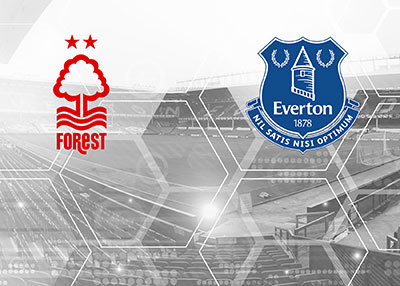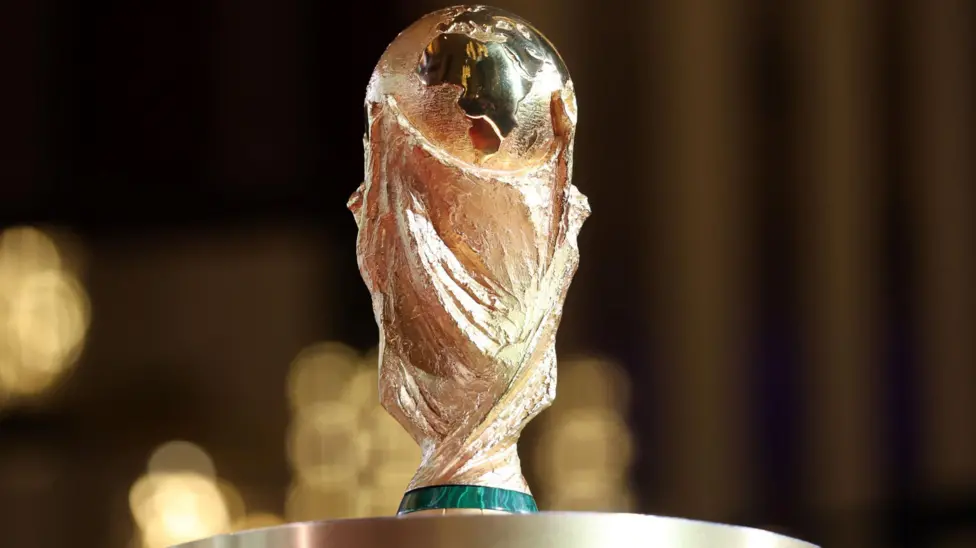VIEW FROM THE BLUE
The End of an Era
Part Two — Home Is Where the Heart Is
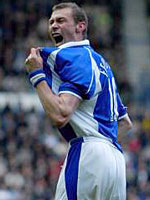
Duncan Ferguson: commanded in excess of £18m in transfer fees in less than a decade
Duncan Ferguson may have become synonymous with Everton during the turbulent years of his first spell with the club, but there were plenty of people who felt a sense of relief at his sudden departure in November 1998.
The £7m fee was a welcome cash injection, even if Walter Smith didn't get to see any of it, and there was a growing feeling that the striker's aerial prowess had become a crutch on which the rest of the team were relying too heavily.
That was deemed acceptable in Joe Royle's "dogs of war" era and in the desperate fight for survival under HK III, but with Smith's arrival came heightened expectations of a brand of football more akin to the School of Science than late-80s Wimbledon.
At the time of Ferguson's move to the northeast, the general perception was that, despite the fact that the transfer was foisted upon him, the player could have turned it down but, drawn by the enormous renumeration on offer at St James Park, he had accepted the deal all too willingly.
The apparent change in Ferguson after joining the Magpies from the recluse who refused to give interviews with the press to the all-smiling, communicative, Sky TV-era football star only seemed to distance him further from the fans he'd left behind on Merseyside. He even contemplated reviving his international career by reconsidering his self-imposed exile from the Scottish national scene.
But the reality was that Duncan had been devastated by the way in which he felt he was forced out of Goodison Park and that the change in his public persona was perhaps a reflection of his desire to make the best of his new situation. When he finally broke his silence over the events surrounding his departure from the club where he had resurrected his career, he revealed that he was "heartbroken to leave the club."
"The move was forced on me," he said "It sickened me. I couldn't believe it. I was happy to be at Everton for life, if they wanted me. In the last couple of days my world has turned upside down."
Tellingly, he also revealed his frustration at never having played with a settled strike partner and that Everton hadn't signed a decent winger to provide him the kind of service on which he thrived.
For those Evertonians who were sorry to lose Duncan, the loss was perhaps tempered by the fact that after making a dramatic start with two goals on his debut against Wimbledon, the controversial Scot's Newcastle career was as disrupted by injury as his time at Goodison Park.
Injuries limited Ferguson to 30 appearances and eight goals for the Magpies over two seasons and severely disrupted what was a promising striker partnership with Alan Shearer.
Meanwhile, back on Merseyside, Everton appeared to have moved on from the Ferguson era. Their first match after Dunc's departure — a 2-1 win at Charlton on the back of an altogether more attractive style of attacking football — may have proven to be something of a false dawn but later that season and into the next the Blue faithful were to witness a more fluid and enterprising Everton thanks largely to a flourishing midfield combination of Don Hutchison and Nick Barmby, the signing of Kevin Campbell in the spring of 1999 and the rise to prominence of Francis Jeffers.
All the more surprising, therefore — or perhaps not that surprising given his penchant for the dramatic — that one of Bill Kenwright's first acts after his successful takeover of Everton was completed in early 2000 was to initiate the return of Ferguson to Merseyside for £3.75m the following summer. While significantly lower than the fee for which he was sold, it was tantamount to a king's ransom for Everton at the time.
With Kevin Campbell struggling with injury and set to miss the first few weeks of the 2000/01 season, the need to bolster the attack was there, but many questioned whether the erratic Ferguson was the answer. Nevertheless, Kenwright, seemingly oblivious to the irony of signing one injury-prone player as cover for another — brought the prodigal son home to his beloved Blues and reunited the fans with their — ugh... — "talisman."
Rumours that Dunc took a 50% pay cut to end his spell at Newcastle and return to the Blues later proved to be unfounded. It is believed that he was earning upwards of £35k a week during his second spell at Goodison and not everyone was happy to see the Big Yin back on such inflated financial terms, especially when the NTL investment deal on which Ferguson's reacquisition was rumoured to be gambled, collapsed apparently due to some dragging of feet at Boardroom level.
In line with the dubious wisdom of the move, Ferguson was injured in just the second game of his first season back at Goodison. Although he scored six important goals, he was in and out of the team for the remainder of that campaign, eventually undergoing surgery to correct his latest problem.
His erratic form continued into the next season and with his apparent tendency to only be "up" for the bigger games on the footballing calendar many began to question whether he had lost his hunger for the game and whether it was the right thing to bring him back to Goodison for a second spell considering his record of injuries.
Indeed, it was his litany of medical complaints that led the club to seek a more in-depth diagnosis of Ferguson's condition and the answer came in the form of a compressed sciatic nerve. The doctor who made the discovery said that he'd probably been suffering from it for as long as four years and that the pain could manifest itself in other areas — like the groin, the leg or the pelvis — making it very hard to diagnose.
With the apparent source of his injury woes corrected, Ferguson regained some fitness and form in the 2003/04 season, now working under the new management of David Moyes who had replaced Walter Smith in March 2002 when the dour Scot had been unceremoniously sacked for leading the club to the brink of the relegation zone amid a run of horrendous results and equally bad transfers.
Moyes and Ferguson didn't always see eye-to-eye, however — a rumoured bust-up between the two in the autumn of 2003 looked at one point to have ended the player's Everton career prematurely — and the striker's effectiveness and desire were regularly questioned. All too often he was the first man down the tunnel after matches rather than staying behind to acknowledge the fans with the other players and when compared with the up-and-coming talent of the new kid on the block, 16 year-old Wayne Rooney, some began to feel that the time for change had arrived.
Nothing seemed to drive that home more than the awful manner in which the 2003/04 season ended. With the players having seemingly given up trying once they had secured safety from relegation, they failed to win any of the last six games of the season, culminating in a 5-1 drubbing at the hands of Manchester City on the final day of the campaign.
There was outrage towards the squad, criticism for the manager and angry demands for action at Board level from the fans which precipitated a summer of false promises and a phoney war between rival Boardroom factions that petered out into nothing with Kenwright first stonewalling and then concocting a shamefully ludicrous story about imminent investment by the so-called Fortress Sports Fund that had Paul Gregg temporarily out-maneouvered.
Ferguson's negative image had been further compounded in the 2003/04 season when he was yet again sent off for violent conduct, this time for grabbing Leicester City midfielder, Stefan Freund, by the neck with both hands in front of the referee. So, as part of a summer of upheavel, Everton made an attempt to buy out Ferguson's £2m contract for £500,000, but the Big Yin dug his heels in and reaffirmed his determination to stay.
His role in the following season, one marked by the absence of Master Rooney after his controversial departure for Manchester United in August 2004, was that of regular substitute as Everton ascended to the unlikely perch of 3rd in the Premiership by Christmas that year. He demonstrated he could still add value in attack for Everton when he popped up to score the winning goal in a five-goal thriller at Carrow Road against Norwich City, a result that characterised the grit and determination of Moyes's few-frills outfit.
The Blues' form began to unravel just before the New Year, though, and Ferguson once again blotted his copybook by earning another red card, this time for elbowing Hermann Hreidarsson at Charlton as Everton lost 2-0 at The Valley.
It looked once again as though he had become an anachronism under the Moyes evolution, a relic of the dogs of war days who, despite his advanced years, still couldn't keep a lid on his wilder side. But, as was the case so often in his career at Everton, Ferguson rose to the occasion again when, with the Blues' Champions League aspirations increasingly threatened by four defeats in the previous six games, Manchester United came to Goodison Park in April 2005.
Amid a red-hot atmosphere, the Big Man connected with a first-half free kick and buried a header into the United goal to set up a historic first victory over the hordes from Old Trafford in a decade. The result provided just enough momentum to carry Everton to the fourth-placed finish they had worked so hard to achieve and earn a shot at Champions League qualification the following August.
His contract up, Ferguson's career at Goodison once more looked to be over but, determined to finish his playing days with the Blues, he accepted a one-year contract on much-reduced wages. And but for a terrible refereeing decision by Collina in the second leg of the Champions League third qualifying round against Villarreal, the Big Yin might have capped a turbulent career by helping Everton into the lucrative group stages of that competition. Instead, a trademark, towering header from a second-half corner that would have levelled the tie on aggregate and possibly forced extra time with the Toffees in the ascendancy was ruled out for a non-existent foul in the area by Marcus Bent.
Eliminated, Everton then crashed out of the Uefa Cup at the first hurdle and their Premiership season collapsed around them as well as the club sank like a stone to the bottom of the table. Ferguson was an increasingly peripheral figure, ineffective in his almost weekly cameos as a substitute. Indeed, were it not for a last-minute penalty in the final game of the season, the Scot would have endured the ignominy of becoming the first Everton no. 9 not to score a goal in an entire season. That would have been a cruel ending even for Duncan who, despite his many transgressions and erratic appearance rate is destined to remain in many fans' hearts forever.

